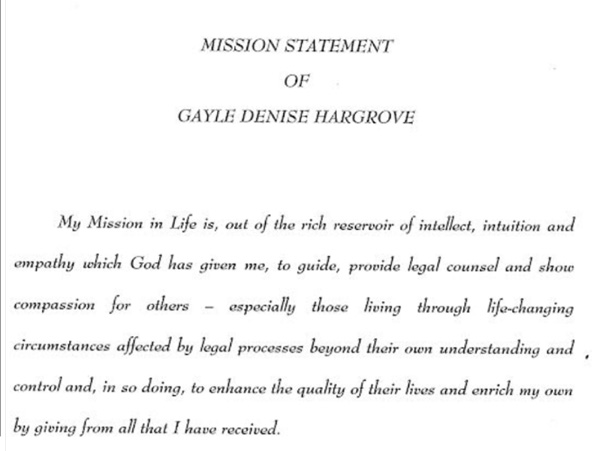Gayle D. Hargrove
Gayle D. Hargrove
Recipient of the WLIB Lifetime Achievement Award
By Kelly Castor, Esq.
On Jun 20, 2023, at the joint WLIB and BCBA Diversity in the Profession Award Dinner, Gayle Denise Hargrove was presented with the Women Lawyers in Bergen Lifetime Achievement Award. Gayle is the first ever recipient of this award. For the last 20 years, Gayle spent her time working in the Bergen Office of the Public Defender, representing indigent individuals from the arraignment to plea dispositions or trial. She worked with investigators, strategized with colleagues and provided resources for clients ensuring sound, quality legal advice.
Growing up Gayle knew that she wanted to be “rich and famous.” She was the daughter of a United Methodist pastor and a social worker, who both prioritized education and earning multiple degrees for themselves and their six children. Gayle went on to attend Boston University where she received a degree in Secondary Education focusing on History and Economics. During this time, she became fascinated with women who were trailblazers. She mentioned women like Shirley Chisolm, who spoke at her United Methodist Church in Montclair and became the first black woman in either chamber of Congress. She also spoke about Barbara Jordan, who was the first black woman Texas State Senator and went on to be the first woman elected to the US House of Representatives serving Texas. These women were making dynamic changes and perhaps were even rich and famous.
Gayle obtained her law degree from Georgetown University in the District of Columbia, where she remained for her first ten years of practice. While in DC she worked in private practice, taught corporate law and evidence as an adjunct professor, and served as an Assistant US Attorney prosecuting cases on behalf of the United States.
Gayle eventually moved her private practice back to New Jersey, settling in Englewood where she regularly appeared in the Bergen Courts. She then found her home at the Office of the Public Defender as an attorney for the Adult Trial Division until she retired in August 2022.
Every time I spoke to Gayle intending to schedule time to conduct this interview, we would get lost in conversations about her life experiences and the people she met along the way. A five-minute phone call intending to schedule a meeting ended up in an hour-long recorded zoom. Gayle and I often speak at events, but this interview process allowed me to get to know her on a deeper level and for that I am appreciative.
When you were younger, what did you want to be?
First, I knew that I wanted to be rich and famous! I’m joking, but I knew that whatever I did I wanted it to influence and impact a great amount of people. I wanted to change the world. First, I was drawn to music, then I realized that I needed a degree that would support my dreams – consistent with my parents’ teachings. That is where the law came in. About half-way through law school, I realized that I couldn’t be like the guys in the back of the class that barely paid attention and still passed. I knew that it was going to take more work than that. I never did become rich or famous, but that’s okay.
Did you ever consider leaving the practice of law?
When I first came back to New Jersey, the racism while practicing was glaring and I was devastated. Because, I still had this desire to make a difference, I took a corporate position with the United Methodist Church Board of Global Ministries. It was satisfying to travel, touch many lives and help the Church. I worked with the Church for four years, but the law called me back.
Can you tell us about your favorite memories about practicing in Bergen?
I remember the time that I represented a client in a drug distribution case. This was before Drug Court was established. I filed a suppression motion and the Judge granted it! I recall the Judge pulling us in chambers and saying, “I was not supposed to grant that motion and I will get hell for it.” Because the drugs were suppressed, the case was dismissed. The client ended up going to community college and then went on to film school… and then I lost track of him.
Another memory I have is representing this 74-year-old man who was accused of assaulting a woman in the senior building. My client and another woman were having tea, aka vodka, in the middle of the afternoon. The woman ended up dying and the prosecutor was ready to escalate the charges to homicide. I worked so hard with the help of the investigator. I even went to see the body; same woman, different wig. Finally, we went to the funeral home and learned that she died as a result of a complication because of her AIDS diagnosis. The older man was released and went home to his family down south.
I loved working in the OPD with Diane, Frank and Saray. They were my support system and I have fond memories of working with them.
One of my most cherished moments was being named a temporary guardian for a child while I was in private practice. She ended up in my care for quite a few years and I really wanted to adopt her as my own. She didn’t want that and that was okay. I wish that our relationship was closer today, but she finished college, went on to graduate school and is doing well. She was also one of the main reasons I decided to take the position with the Office of the Public Defender.
What was a challenging experience you have faced related to law?
One day, I appeared for court, placed my items on the conveyor belt and showed my attorney ID to a Sheriff’s officer. He asked me to step aside, I complied. The officer then asked me to put my hands on my head and my nose to the wall. As he searched my body and my bag he told me that I was impersonating an attorney and was glad he caught me. It was one of the most humiliating experiences and after the supervisor released me, I walked away like nothing happened and handled my calendar, but I will never forget that. I replayed it in my head.
There was a particular Judge that would hold my cases until late in the afternoon before calling me. It didn’t matter if I got there with the first round of attorneys, they would leave and I would still be there waiting. One attorney encouraged me to stand up, it made no difference; this was intentional.
Speaking to other Black attorneys at that time, I learned that I was not the only one receiving disparate treatment. We were getting mistaken for defendants, family members, everything but attorneys. A lot of the Black attorneys I knew left Bergen County. The same way that we as attorneys defend the defenseless, it is truly important to have allies supporting groups that aren’t as visible in Bergen.
What did you learn from these experiences?
What I learned is that when you have the right people in power things change. When former BCBA President Cathe McAuliffe changed the name from “Minority Concerns Committee” to the “Diversity Committee,” I was thrilled. I did not like the title “minority concerns.” It sounded like the minorities have a problem instead of the Association is seeking to cure a problem – a group of complainers versus a group committed to action. This decision was wise and forward thinking.
I also learned that I had to be prepared for my cases at all times. I was not going to be given an opportunity to fix a mistake and no one was going to take it easy with me, so I needed to be ready.
I learned that speaking to other attorneys while you are waiting for your case to be called creates community. Be present regardless of if you are the only Black face in the room. Go to the Bar Association events. Judges are not the same when they aren’t on the bench. Do not waste a valuable opportunity.
Why did you join WLIB?
The first few times I went to a WLIB event, I am not sure if I was a member or just participated. I recall not necessarily feeling included at first, so I stopped attending. Then Cathe McAuliffe became the first female president of the BCBA, she encouraged me to join WLIB. Yes, WLIB, not the bar. Cathe and I would discuss her mission trips and she would say that “You won’t get rich in your pocketbook helping people, but you will be rich.” Her views aligned with mine and I trusted her recommendations.
Diane Lucianna, who was not president at the time, would always invite me to come to WLIB events. Judge Lois Lipton, who couldn’t attend the events because she was a Drug Court Judge, would ask about them, which encouraged me to attend so I had a response to give her. The encouragement of these individuals reaching out motivated me to go. Then when I would attend, I felt welcomed not just by these individuals, but also Senator Loretta Weinberg, Jan Phillips, Eileen Mulroy and a host of other women. I became a member, regularly attended events, and even encouraged others to participate. It’s a great organization.
What does it mean to you to receive the WLIB’s Lifetime Achievement Award?
At first, I didn’t know how to feel. Every day I just get up and go. I didn’t realize that people paid attention to the work that I do.
I would believe that everyone, at some point in their life, questions whether the things that they are doing is making an impact. Everyone wants to make a difference. This award was acknowledgement for what I internally thought was being ignored. It was part of my dream to make a difference and the Women of the Bar are telling me “You did it!” I did make a difference! This feeling is amazing! It created in me an impetus to do something that allows me to continue to shine a light in my own way.
I was also greatly surprised when Hon. Sandra Robinson honored me with a plaque thanking me for of all the hours of public service from the National Association of Negro Business and Professional Women. I am so grateful.
What advice would you give a young attorney?
This hair loss I’m experiencing happened when my immune system was weak and was brought on by stress. The internal stress was the consequence of my career. I would advise that young attorney to calm down, relax. Everything will get done.
Except for the attorneys that intentionally seek to be in the public eye, no one knows the names of that person’s attorney. If Trump’s attorney was not indicted, we would never have known their name. You’re just a face and then you’re gone. Protect your mental health.
Take your case, measure the value, and decide which way you want to go.
And of course, join WLIB and create your support system.
Gayle, thank you so much for your time. It is always so much fun speaking to you. Would you mind if I share your mission statement?
Yes, please share it and I recommend that you make one as well. Throughout the years I adjusted it slightly, but I have not changed the






